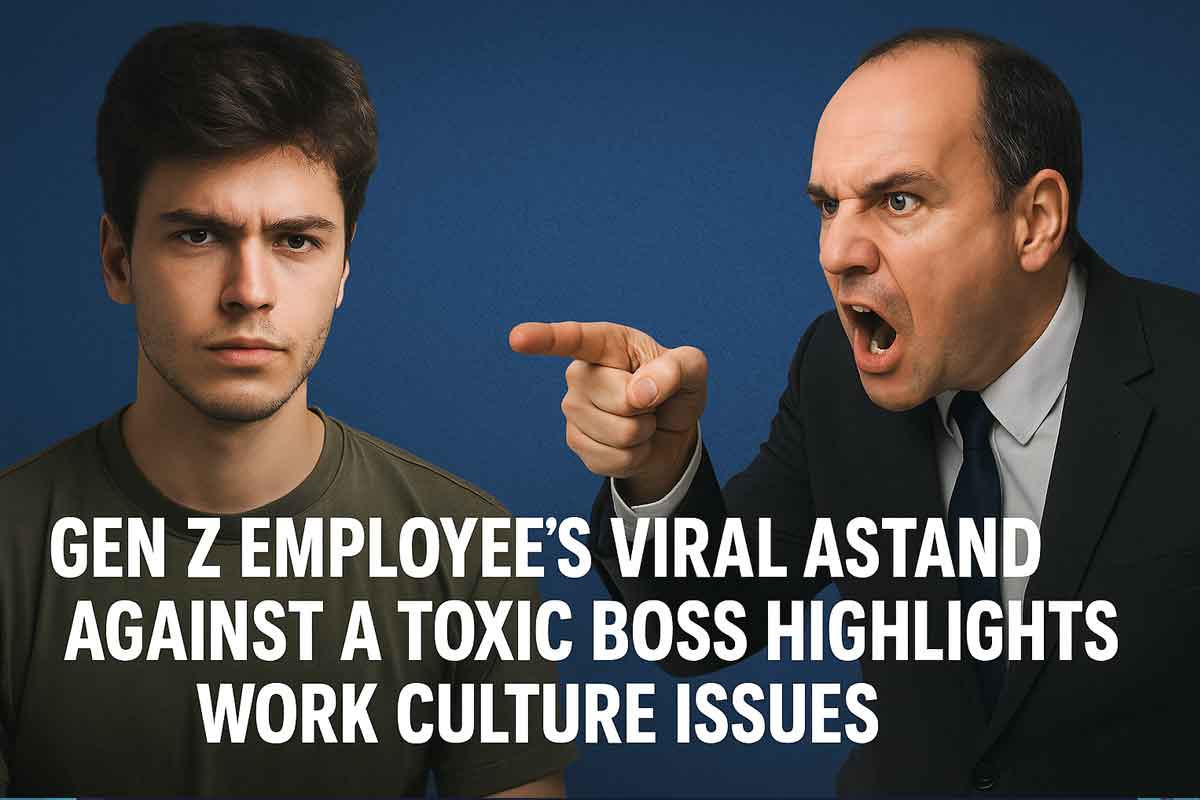A viral chat featuring a Gen Z employee and a toxic boss has sparked widespread conversation about modern workplace culture. The exchange, which circulated across news sites and social platforms, demonstrates how younger employees are challenging outdated management behaviours and prioritising emotional well-being and fairness.
The chat resonated with thousands because it reflects a reality many young professionals relate to—insensitive leadership, unrealistic expectations and a lack of basic empathy during personal hardships.
Gen Z Employee and Toxic Boss Chat
The now-viral chat begins with the employee informing their manager about the death of a close family member and requesting a day off. Instead of showing empathy, the manager demanded that the employee still attend an important client meeting, arguing that the relative “was not immediate enough” to justify leave.
The employee responded firmly yet respectfully, stating that loss should never be measured by hierarchy and that emotional well-being takes priority. This triggered an unexpected reaction from the boss, who insisted on marking the leave as unpaid and even requested a death certificate.
What stood out in the chat was the employee’s calm refusal to accept disrespect, saying they were “standing up for basic human decency.” That line alone struck a chord with thousands online.

Full Details of the Viral Chat Between Gen Z Employee and Toxic Boss
Employee (late night, trembling fingers):
Sir… I just told you my uncle passed away last night. I need to be with my family today. They need me.
Boss (cold, dismissive):
Today is the client meeting. It’s extremely important. Attend the meeting first, then go. He wasn’t even your parent.
Employee (anger rising):
With due respect, a death in the family is still a death. He raised me like his own. He was more than a parent to me.
You expect me to sit in a client meeting pretending nothing happened?
Boss (irritated):
I’m not saying it isn’t sad. But the client won’t wait.
Employee (hurt, firm):
And life doesn’t wait either. I’ve given this job everything—late nights, weekends, missed moments with my family.
But today, I need to stand by them. If that is an inconvenience, maybe you should rethink how you treat your people.
Boss (snapping):
Watch your tone. You’re overreacting.
Employee (voice steady, tired of silence):
No. I’m finally reacting after years of staying quiet. This isn’t about work. It’s about basic humanity.
If that’s too much for you to understand, maybe I’m working for the wrong person.
Boss (threatening):
Maybe you won’t be working at all. Meet me tomorrow with HR. This behavior is unacceptable.
Employee (resigned but calm):
Fine. I’ll be back on Monday.
Boss (vindictive):
I don’t want to see you. You don’t respect your seniors. I’m marking today and Monday as LWP.
Bring a death certificate if you want this cleared and marked as PTO.
Employee (final message, quiet but cutting):
Alright.
Real mature, sir. Real mature.
Gen Z Employee Stands Up Against Toxic Work Culture
This incident is now seen as a defining example of how modern employees, especially Gen Z, approach work differently from previous generations. Experts suggest that Gen Z workers:
- Expect empathy, fairness and respectful communication from leaders
- Do not tolerate toxic or emotionally dismissive behaviour
- Prioritise mental health and family commitments
- Are willing to call out unfair practices directly
- Believe in healthy boundaries between professional and personal life
The viral conversation contributed to a larger dialogue about work culture, management practices and the need for organisations to rethink how they treat employees during emotionally challenging times.
Key Details
- Incident Type: Employee requesting bereavement leave
- Key Conflict: Toxic boss dismissing personal loss as “not important enough”
- Employee Response: Calm, firm and respectful pushback
- Public Reaction: Strong support for the employee, criticism for the manager
- Broader Message: Need for empathy and healthier workplace communication
Disclaimer
This article is based on publicly accessible news reports and viral social content. The purpose is to highlight discussions around workplace culture and employee well-being. The content should not be considered a verification of the individuals involved and is meant solely for informational and editorial use.
FAQs
Q1. Why did the Gen Z employee’s chat become viral?
Because it highlighted a relatable struggle—standing up to a toxic boss who lacked basic empathy. The employee’s composed and honest response resonated across social media.
Q2. How do Gen Z employees usually respond to toxic work environments?
Gen Z workers often prioritise mental health and boundaries. They are more likely to speak up, question unfair treatment and push for respectful communication rather than silently tolerate toxicity.
Q3. Does this incident reflect a larger workplace trend?
Yes. Many workplaces globally are experiencing a shift as younger employees expect humane treatment, work-life balance and transparency from leadership.